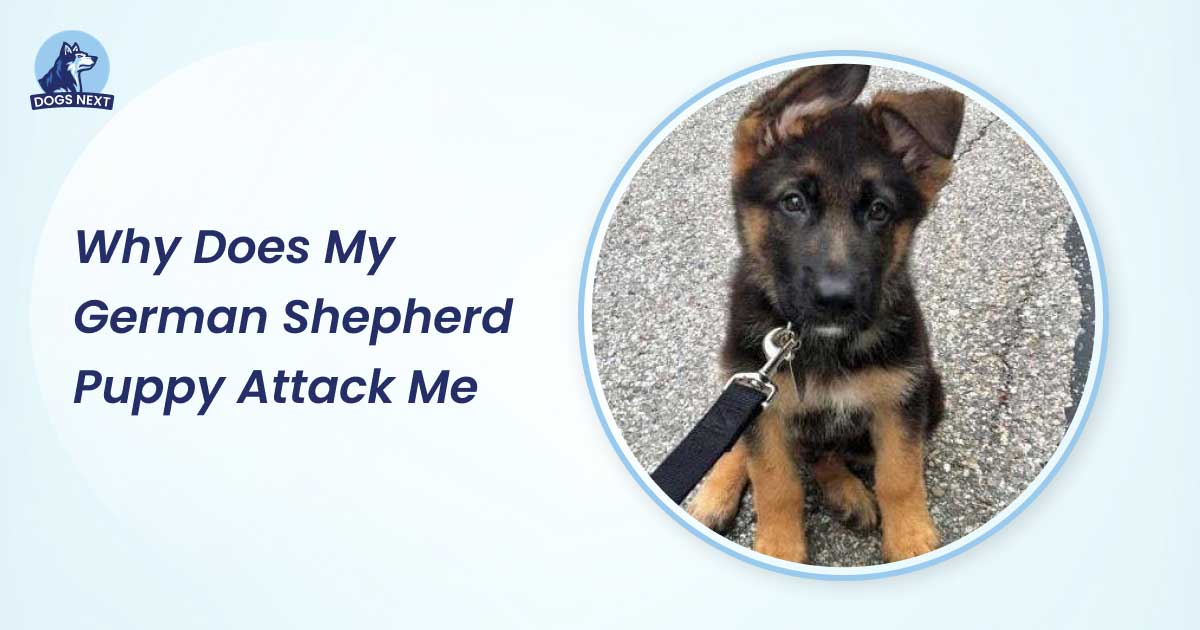Your German Shepherd puppy may be attacking you due to teething or a lack of proper training. Redirect their energy with toys and positive reinforcement.
German Shepherd puppies are energetic and curious. They often use their mouths to explore their environment, which can result in biting. Teething can cause discomfort, leading them to chew on various objects, including your hands. Proper training is crucial to teach them acceptable behavior and boundaries.
Positive reinforcement, like treats and praise, helps them learn faster. Providing plenty of chew toys can also alleviate teething pain and keep them occupied. Regular exercise and mental stimulation are essential to prevent boredom and aggressive behavior. Consistency and patience are key to raising a well-behaved German Shepherd puppy.
Playful Aggression In Puppies
Is your German Shepherd puppy suddenly attacking you? The good news is, it’s likely due to playful aggression in puppies. Understanding why your puppy behaves this way can help you manage and redirect this energy. Let’s explore the reasons behind this behavior.
Natural Puppy Behavior
Puppy biting behaviors are a normal part of their development. Puppies use their mouths to explore the world around them. They might bite your hands, feet, or even your clothes. This is how they learn about their environment.
During their early weeks, puppies play with their littermates using their mouths. This play teaches them important social skills. They learn how hard they can bite without hurting their siblings. Here are some common reasons why your puppy might bite:
- Teething pain relief
- Exploring new objects
- Seeking attention
- Playing and having fun
Understanding puppy behavior is crucial. Puppies don’t know their bites can hurt you. They just want to play and interact with you. Over time, they will learn to control their bites.
Learning Boundaries Through Play
Puppies learn boundaries through play. When they bite too hard, their littermates yelp and stop playing. This teaches the biting puppy to be gentler. You can mimic this behavior to teach your puppy limits.
Here are some steps to control playful biting:
- When your puppy bites too hard, say “ouch” in a high-pitched voice.
- Stop playing with them for a few seconds.
- Resume play if they are calm.
- Repeat consistently to reinforce gentle play.
Consistency is key. Your puppy will understand that biting too hard ends the fun. This method is called playful biting control. It helps your puppy learn the boundaries of acceptable behavior.
Energy Release And Excitement
Puppies have high energy levels. They need to release this energy through play and exercise. Sometimes, their excitement can lead to biting. This is another form of playful aggression in puppies.
To manage this energy, ensure your puppy gets plenty of physical and mental stimulation. Here are some activities to help:
- Daily walks
- Interactive toys
- Training sessions
- Playdates with other puppies
A tired puppy is less likely to engage in aggressive play. Understanding puppy behavior helps you provide appropriate outlets for their energy.
Remember, your German Shepherd puppy isn’t attacking you out of malice. They are learning about the world and their own strength. With patience and consistent training, you can guide them to more appropriate behaviors.
Common Triggers For Puppy Attacks
Is your German Shepherd puppy attacking you unexpectedly? Understanding the common triggers for puppy attacks can help you address and manage this behavior. Often, these attacks are not acts of aggression but rather signs of discomfort or unmet needs. Let’s explore some common triggers that might be causing your puppy to lash out.
Overstimulation
Overstimulation is one of the primary puppy biting triggers. Puppies, especially German Shepherds, have high energy levels. They can become overstimulated easily, leading to biting and nipping. Here are some signs of overstimulation:
- Excessive barking
- Restlessness
- Jumping up and down
- Biting and nipping
Detecting overstimulation early can prevent attacks. Ensure your puppy has enough physical and mental exercise. Regular walks, playtime, and training sessions can help. Create a calm environment and provide chew toys to keep your puppy occupied.
Consider the following table for activities to help manage overstimulation:
| Activity | Duration |
|---|---|
| Walks | 30-45 minutes |
| Playtime | 20-30 minutes |
| Training Sessions | 15-20 minutes |
Lack Of Boundaries
A lack of boundaries is another common puppy attack cause. Puppies need to learn what behaviors are acceptable. Without clear boundaries, they may bite and attack to test limits. Establishing rules and being consistent with them is crucial.
Here are some tips to set boundaries:
- Teach basic commands like “sit” and “stay”.
- Use positive reinforcement to reward good behavior.
- Ignore or redirect bad behavior.
- Provide a designated area for your puppy to play and rest.
Consistency is key. Ensure all family members follow the same rules. This helps your puppy understand expectations and reduces instances of biting and attacks.
Teething Discomfort
Teething discomfort is a significant puppy biting trigger. Puppies, like human babies, experience pain and irritation when teething. This discomfort can lead to biting and nipping as they seek relief.
Signs of teething discomfort include:
- Excessive chewing
- Drooling
- Red or swollen gums
- Increased irritability
Understanding teething pain can help you provide appropriate relief. Offer your puppy suitable chew toys designed for teething. Cold, rubber toys can soothe sore gums. Avoid giving hard objects that could damage their teeth.
Here are some recommended teething aids:
| Teething Aid | Benefits |
|---|---|
| Rubber Chew Toys | Soothes gums, durable |
| Frozen Washcloths | Reduces swelling, easy to make |
| Teething Rings | Provides relief, safe to chew |
By addressing these triggers, you can help your German Shepherd puppy feel more comfortable and reduce biting incidents.
Training Tips To Manage Aggressive Play
Getting a new puppy can be exciting, but it also comes with challenges. One common issue with German Shepherd puppies is aggressive play. This behavior can be alarming and needs to be addressed early. Here are some puppy training tips to manage aggressive play effectively.
Teach Bite Inhibition
Bite inhibition training is crucial for your German Shepherd puppy. Puppies naturally explore the world with their mouths, but they need to learn how to control their bites.
Here are some steps to teach bite inhibition:
- React immediately when your puppy bites you. Say “ouch” loudly and withdraw your hand.
- Stop playing and ignore your puppy for a few minutes. This shows that biting stops fun activities.
- Resume play and repeat if biting happens again.
Consistency is key. Your puppy will learn that biting means playtime ends. This method helps your puppy understand the limits of acceptable behavior.
Use Redirection Techniques
Redirection techniques are effective in managing biting behavior. The goal is to divert your puppy’s attention from biting you to something more appropriate.
Here are some redirection strategies:
- Provide chew toys. When your puppy starts to bite, offer a chew toy instead. This teaches them what is acceptable to bite.
- Engage in interactive play. Use toys like tug ropes or balls to keep their focus on the toy rather than your hands.
- Use commands. Teach commands like “leave it” or “drop it” to control their biting behavior.
These techniques help your puppy learn that biting people is not acceptable and encourages them to play with toys.
Establish Calm Behavior Rewards
Rewarding calm behavior is essential in managing biting behavior. Your German Shepherd puppy needs to understand that being calm and gentle is rewarded.
Follow these steps to establish calm behavior rewards:
- Praise and treat your puppy when they are calm. Use treats and verbal praise to reinforce this behavior.
- Ignore hyperactivity. Do not reward jumping or biting with attention.
- Create a calm environment. Use a designated quiet space for your puppy to relax.
By rewarding calm behavior, your puppy will learn to associate being gentle with positive outcomes. This method reinforces the behavior you want to see.
Frequently Asked Questions
Why Does My German Shepherd Puppy Bite?
Puppies bite to explore their world and relieve teething pain. It’s a natural behavior. However, consistent training and socialization can help curb this habit.
How Can I Stop My Puppy From Attacking?
Use positive reinforcement and redirection to teach good behaviors. Consistency is key. Always reward calm behavior and provide chew toys to divert attention.
Is Biting Normal For German Shepherd Puppies?
Yes, biting is normal for puppies as they explore. Training and socialization can help reduce excessive biting. It’s essential to start early.
What Are Common Reasons For Puppy Aggression?
Puppy aggression can stem from fear, teething, or lack of socialization. Ensuring proper training and social experiences can mitigate aggressive behaviors.
Conclusion
Understanding your German Shepherd puppy’s behavior is key. Address their needs with patience and training. This ensures a well-behaved, loving companion. Use positive reinforcement and socialization to foster trust. Remember, consistency is crucial. Seek professional help if needed. Your efforts will strengthen the bond with your loyal friend.

I’m David, an expert contributor and writer, with two furry friends of my own, I know the challenges of raising and caring for dogs. From training to nutrition and health, my goal is to provide valuable insights and advice to help create strong bonds and happy, healthy lives. Find me in Twitter.




